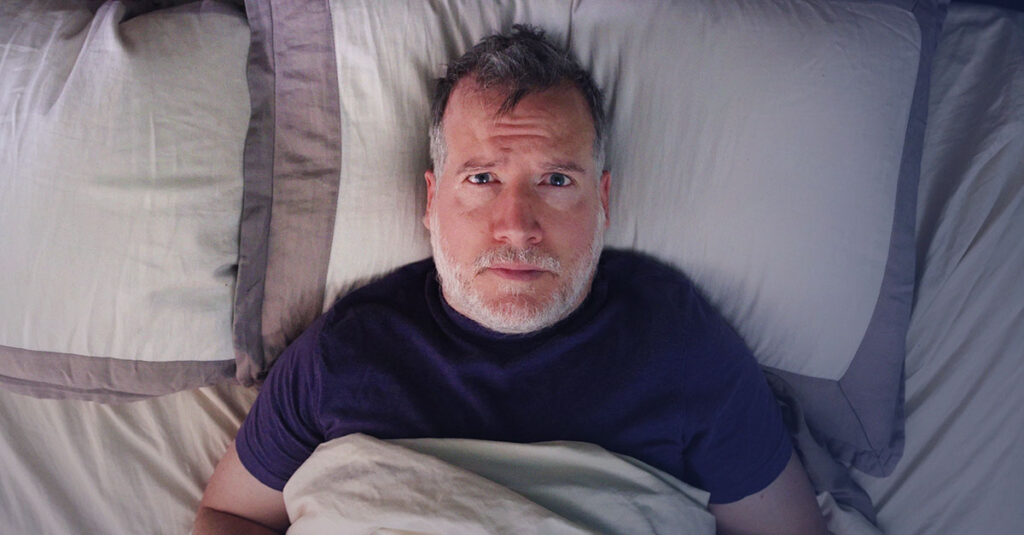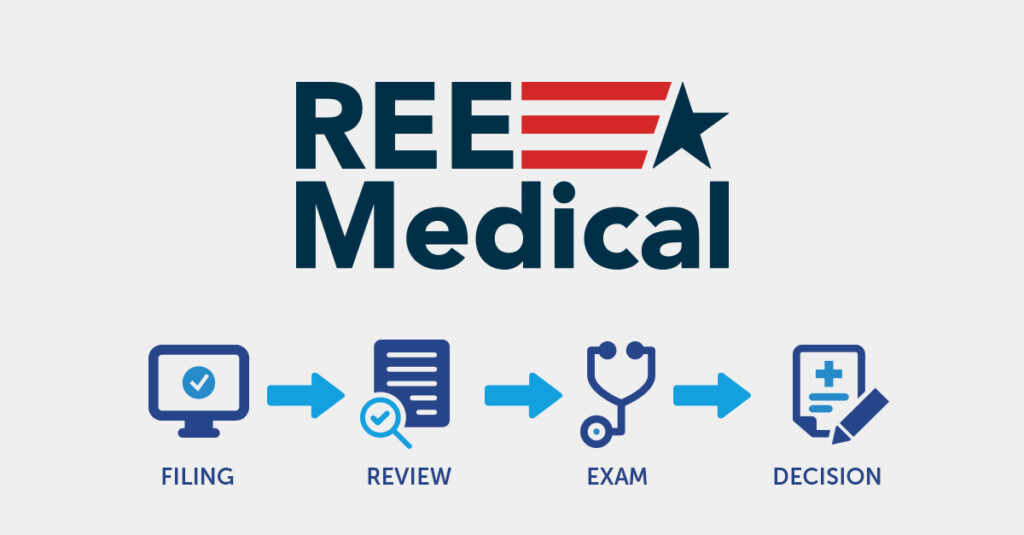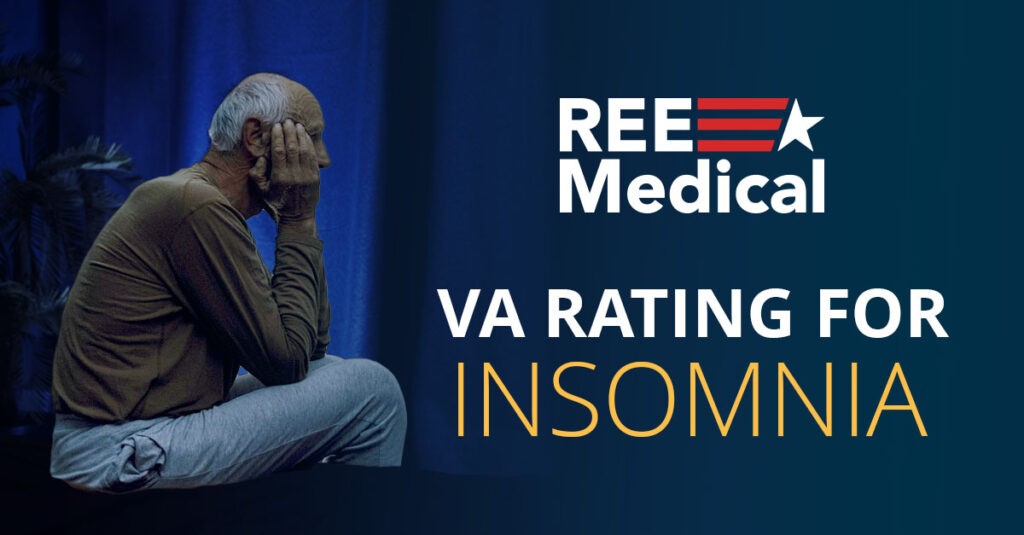Navigating the Department of Veterans Affairs (VA) disability system can feel complex, particularly for conditions such as insomnia. This guide explains how the VA evaluates insomnia, what medical evidence is typically reviewed, and how the rating process reflects the condition’s impact on daily life and occupational functioning.
It also outlines how insomnia may be connected to military service—either directly or as a secondary condition to issues like post-traumatic stress disorder (PTSD), chronic pain, or tinnitus—and what kinds of clinical documentation are most relevant to VA review.
REE Medical coordinates access to independent, licensed healthcare providers who prepare objective medical documentation, including Disability Benefits Questionnaires (DBQs), that align with VA evidentiary standards. The company does not prepare, present, or submit VA disability claims and does not provide legal or representational services.
TL;DR
- Rated as a mental health condition: The VA applies the General Rating Formula for Mental Disorders when evaluating insomnia, focusing on how symptoms affect social and occupational functioning.
- Service connection: The VA reviews whether insomnia began during, was aggravated by, or is secondary to a service-connected condition (e.g., PTSD, tinnitus, chronic pain).
- Evidence considered: Relevant documentation includes medical records, a formal diagnosis, treatment notes, DBQs, lay statements, and medical opinions. Sleep studies are generally used to rule out sleep apnea, not to diagnose insomnia itself.
- Severity and rating levels: Higher ratings correspond to greater impairment in functioning and may qualify for Total Disability based on Individual Unemployability (TDIU) in severe cases.
- Medical documentation support: REE Medical works with independent providers who provide detailed, clinically grounded DBQs to support accurate VA evaluations
Why Accurate Insomnia Ratings Matter

An accurate evaluation of insomnia ensures that veterans receive the appropriate medical attention and resources for a condition that can significantly affect health, work, and daily well-being. Chronic sleep disturbance can impair concentration, emotional regulation, and overall functioning. Understanding how the VA measures and interprets these effects assists in ensuring that medical documentation aligns with the agency’s criteria.
This guide explains how the VA evaluates insomnia, what evidence is typically reviewed, and how professional medical documentation contributes to a fair and thorough review process.
How the VA Evaluates Insomnia
The Department of Veterans Affairs (VA) assesses insomnia using the General Rating Formula for Mental Disorders (38 C.F.R. § 4.130), the same framework applied to other mental health conditions.
This formula measures the degree of occupational and social impairment resulting from symptoms such as poor concentration, mood instability, and reduced work reliability. The evaluation focuses on how chronic sleep loss interferes with daily functioning rather than on the number of hours slept.
What Is Insomnia According to the VA and Medical Standards?
In medical terms, insomnia disorder involves persistent difficulty falling or staying asleep, or waking unrefreshed despite adequate opportunity for rest. According to the Diagnostic and Statistical Manual of Mental Disorders (DSM-5), these symptoms must cause clinically significant distress or impairment in daytime functioning.
For VA purposes, documentation that demonstrates how insomnia affects overall functioning—work performance, emotional regulation, and social engagement—is central to the evaluation.
Application of the General Rating Formula for Mental Disorders
Under the General Rating Formula, VA examiners review the extent to which insomnia contributes to occupational and social impairment.
Relevant clinical observations may include:
- Frequency and duration of disturbed sleep patterns
- Effects of fatigue or poor concentration on work performance
- Influence on judgment, mood stability, and interpersonal relationships
These findings are compared with the rating criteria that range from 0 percent to 100 percent, reflecting progressively greater levels of functional impairment.
What Are the VA Disability Rating Percentages for Insomnia and Their Meanings?
The Department of Veterans Affairs (VA) assigns disability ratings for insomnia on a scale from 0 percent to 100 percent under the General Rating Formula for Mental Disorders (38 C.F.R. § 4.130). Each percentage level corresponds to the degree of occupational and social impairment documented in the medical evidence.
Higher evaluations reflect more significant limitations in functioning and may result in greater monthly compensation as defined by VA benefit tables. Understanding these levels aids veterans and healthcare providers in aligning documentation with the observed impact of insomnia on daily life and employability.
Establishing Service Connection for Insomnia

To qualify for disability compensation, the VA must determine that insomnia is service connected—meaning it began during, was aggravated by, or is secondary to another service-connected condition. Service connection can be direct or secondary, depending on the evidence available.
What Is Direct Service Connection and How Is It Proven for Insomnia?
A direct service connection is established when medical and service records demonstrate that sleep difficulties first appeared or worsened during active duty.
Relevant documentation may include service treatment notes describing sleep disturbance, incident or deployment reports reflecting disrupted rest patterns, and post-service medical records showing continuity of symptoms.
This evidence aids in confirming that the current diagnosis of insomnia is consistent with events or conditions that occurred while in service.
How Does Secondary Service Connection Work for Insomnia?
A secondary service connection applies when insomnia results from or is aggravated by another condition that is already recognized as service connected. Common examples include post-traumatic stress disorder (PTSD), chronic pain, or tinnitus, all of which can contribute to persistent sleep disruption.
Medical opinions that describe the physiological or psychological relationship between these conditions—such as a DBQ completed by a licensed clinician—are often central to the VA’s review. Establishing secondary connection may influence the overall combined disability evaluation when insomnia contributes to additional functional impairment.
Evidence Commonly Reviewed in VA Evaluations for Insomnia
To establish that insomnia is related to military service, the Department of Veterans Affairs (VA) requires objective medical and historical documentation. The evidence typically reviewed includes:
- Formal medical diagnosis: Confirmation of insomnia or a related sleep disorder by a qualified clinician.
- Service treatment records: Documentation from the period of service that notes sleep disturbance, fatigue, or related complaints.
- Compensation and Pension (C&P) examination report: A VA-scheduled evaluation describing current symptoms, frequency, and impact on daily functioning.
- Lay or witness statements: Observations from family members, coworkers, or friends describing noticeable sleep problems and daytime fatigue.
- Sleep study or diagnostic testing: Objective data that clarifies the presence and severity of sleep disturbance when available.
Comprehensive documentation across these sources allows VA reviewers to determine whether the condition is consistent with service-related causes and to assign an appropriate evaluation level.
What Are the Common Secondary Conditions Linked to Insomnia for VA Disability?

Insomnia often co-occurs with other service-related conditions. Understanding these clinical relationships assists in ensuring complete medical documentation.
How Does PTSD Cause or Worsen Insomnia in Veterans?
Veterans diagnosed with PTSD commonly experience heightened alertness, nightmares, and anxiety that interfere with restorative sleep. When medical evidence indicates that insomnia results from PTSD, the VA may consider the conditions together when determining overall impairment.
Can Chronic Pain Lead to or Aggravate Insomnia?
Pain from musculoskeletal or nerve injuries can interrupt sleep and lead to ongoing insomnia. Documentation showing that pain symptoms contribute to poor sleep quality provides context for VA evaluations.
What Role Do Anxiety, Depression, and Tinnitus Play in Insomnia Claims?
Emotional distress, intrusive thoughts, or ringing in the ears, along with other mental health conditions, can all prevent sustained rest. Clinical notes linking these symptoms to disrupted sleep are often reviewed when assessing secondary relationships.
Are Sleep Apnea and Gulf War Syndrome Related to Insomnia VA Ratings?
Although distinct from insomnia, sleep apnea and Gulf War Syndrome (GWS) can include overlapping symptoms such as fragmented sleep or fatigue. Medical records demonstrating these interactions can aid in clarifying diagnostic complexity during VA review.
What Medical Evidence Strengthens Your VA Disability Claim for Insomnia? DBQs and Sleep Studies

The Department of Veterans Affairs (VA) bases insomnia evaluations on objective medical documentation rather than personal reports alone. Three types of clinical evidence are often central to these reviews: Disability Benefits Questionnaires (DBQs) and sleep studies. Together, these records clarify diagnosis, severity, and potential service relationships.
What Is a Disability Benefit Questionnaire (DBQ) and Why Is It Important?
A Disability Benefits Questionnaire (DBQ) is a standardized form developed by the VA for use by qualified medical professionals. It ensures that relevant symptoms, functional limitations, and treatment responses are described using consistent criteria that align with the VA’s rating framework.
For insomnia, DBQs typically include information on sleep quality, frequency of disturbances, and the impact of fatigue or impaired concentration on daily functioning. Comprehensive completion of this form allows VA reviewers to assess the condition using the appropriate diagnostic and rating standards.
When Are Sleep Studies Needed and How Do They Support Your Claim?
Sleep studies—such as polysomnography—record physiological data during rest, including sleep duration, awakenings, and breathing patterns. While not always required for insomnia, these studies can document sleep fragmentation, short total sleep time, or other disturbances that support an objective diagnosis. Such clinical data may be referenced in the overall evaluation of symptom severity.
How Do Lay Statements and Medical Records Contribute to Your Insomnia Claim?
In addition to clinical documentation, lay statements and treatment records can provide valuable context. Statements from family members, colleagues, or supervisors may describe observed fatigue, irritability, or difficulty concentrating.
Service and post-service medical records demonstrate treatment patterns, continuity of symptoms, and responsiveness to therapy. Together, these materials offer a comprehensive view of how insomnia affects overall functioning and quality of life.
How Does the VA Evaluate Increases and TDIU for insomnia?
The Department of Veterans Affairs (VA) may reconsider an insomnia evaluation when new medical documentation shows a change in severity or functional impact. If sleep-related symptoms substantially interfere with the ability to maintain substantially gainful employment, the VA may also review eligibility for Total Disability based on Individual Unemployability (TDIU), which compensates at the 100% rate when service-connected conditions prevent sustained work.
Decision Review Options for a Denied or Low Insomnia Evaluation
Under the Appeals Modernization Act (AMA), veterans who disagree with a decision can select one of the following review lanes:
- Supplemental Claim – Allows submission of new and relevant evidence (for example, updated medical records or clinician opinions).
- Higher-Level Review – A senior VA adjudicator re-examines the existing record (no new evidence is added).
- Board of Veterans’ Appeals (BVA) – A Veterans Law Judge reviews the case; options may include a direct review, evidence submission, or a hearing.
Each lane follows VA procedures published on VA.gov and focuses on the evidence of record for determining the appropriate evaluation under 38 C.F.R. § 4.130.
How the VA Considers Total Disability Based on Individual Unemployability (TDIU) for Insomnia
Total Disability based on Individual Unemployability (TDIU) allows veterans whose service-connected conditions prevent substantially gainful employment to receive compensation at the 100-percent rate.
For insomnia, the VA reviews whether chronic sleep disturbance, fatigue, or related symptoms significantly limit occupational functioning. TDIU may be considered when:
- Service-connected conditions result in marked impairment in maintaining employment; and
- The combined evaluation meets schedular thresholds under 38 C.F.R. § 4.16 (typically a single disability rated at 60 percent or a combined rating of 70 percent with one at 40 percent or higher).
Supporting documentation usually includes recent clinician evaluations, work-impact statements, and evidence of how symptoms interfere with concentration, attendance, or performance.
Documentation Commonly Reviewed for Increased Evaluations of Insomnia

When a veteran seeks reevaluation for insomnia, the VA typically reviews updated clinical and functional evidence to determine if symptom severity or daily impact has changed.
Examples include:
- Updated Disability Benefits Questionnaires (DBQs): Completed by qualified providers to reflect current symptom frequency, severity, and occupational effects.
- Revised medical opinions: Provide professional analysis of causal or aggravating relationships and note any clinical changes over time.
- Employment-related documentation: Work evaluations, attendance records, or vocational assessments describing the impact of poor sleep on reliability and productivity.
- Treatment records: Notes from therapy, medication management, or cognitive-behavioral treatment for insomnia (CBT-I).
- Sleep studies or diagnostic updates: Objective data showing sleep efficiency, awakenings, or related disturbances.
Collectively, this information allows VA adjudicators to assess whether the current rating accurately reflects the level of occupational and social impairment.
How the VA Reviews Requests for Increased Insomnia Evaluations
When a veteran’s symptoms or daily functioning change over time, the Department of Veterans Affairs (VA) may review updated medical and occupational evidence to determine whether a new evaluation is appropriate. The focus is on whether the current record reflects increased severity or additional limitations compared to the prior assessment.
Common forms of documentation that may support a reevaluation include:
- Updated Disability Benefits Questionnaires (DBQs): Completed by a qualified clinician to reflect current symptoms, treatment response, and occupational or social effects.
- Revised medical opinions: Provide professional insight into whether the condition has progressed or is now aggravated by another service-connected issue.
- Employment-related evidence: Records or evaluations describing how fatigue, concentration problems, or daytime impairment influence job reliability or performance.
- Ongoing treatment notes: Documentation of therapy, medication management, or behavioral sleep interventions such as CBT-I.
- New diagnostic data: Sleep studies or other assessments confirming changes in sleep quality or duration.
Together, these materials give VA adjudicators a comprehensive picture of how insomnia affects daily life and functioning, allowing for an accurate rating determination in accordance with 38 C.F.R. § 4.130.
How REE Medical Support Veterans in Obtaining Accurate Medical Evidence for Insomnia Evaluations?

Accurate and detailed medical documentation is essential in the VA disability evaluation process. REE Medical connects veterans with independent, licensed medical professionals who complete comprehensive assessments and documentation, such as Disability Benefits Questionnaires (DBQs), consistent with VA requirements. This coordination aids in ensuring that medical evidence clearly reflects the clinical picture of insomnia and its functional impact.
What Sets REE Medical’s Medical Evaluations Apart?
REE Medical’s network of physicians includes experienced providers familiar with VA documentation standards. Using standardized VA forms—such as the Mental Disorders DBQ—they record the frequency, severity, and occupational or social effects of sleep-related symptoms. This detailed and structured approach produces clear, objective reports that align with the terminology and criteria outlined in 38 C.F.R. § 4.130, reducing ambiguity in the medical record.
How Can Veterans Access REE Medical’s Free Consultation and Claim Support?
Veterans can schedule a complimentary consultation through REE Medical’s website to learn more about obtaining medical evaluations or DBQs supported by independent, licensed professionals. During the consultation, representatives explain the documentation process and how medical evaluations are coordinated.
REE Medical does not prepare, present, or submit VA disability claims and does not provide legal or representational services. The company’s role is limited to facilitating access to independent medical documentation that may be used in the VA review process.
Schedule Your Free Consultation Today!
The Broader Impact of an Accurate VA Evaluation for Insomnia
A proper VA evaluation for insomnia can have far-reaching effects on a veteran’s overall stability and well-being. Beyond financial considerations, an accurate rating ensures that the medical and functional impact of chronic sleep disturbance is fully recognized and appropriately supported.
How Does an Accurate Insomnia Rating Affect Monthly VA Disability Benefits?
The most direct benefit of a higher insomnia rating is increased monthly compensation. This extra income can make a significant difference, assisting you in covering the costs of treatments, medications, and other expenses related to managing your sleep disorder. Financial stability can reduce stress, allowing you to focus more on your health and recovery.
What Are the Quality of Life and Employment Implications of a VA Insomnia Rating?
An accurately assigned disability rating directly influences the level of monthly compensation a veteran receives. This compensation can somewhat offset expenses associated with treatment, medications, and lifestyle adjustments needed to manage chronic insomnia. Greater financial stability may also ease stress, allowing for improved focus on health, recovery, and participation in daily activities.
How Can a Proper Rating Lead to Additional Benefits and Healthcare Access?
Accurate recognition of insomnia-related impairment can contribute to better quality of life and improved workplace outcomes. Veterans whose sleep disorders significantly affect concentration, attendance, or performance may become eligible for reasonable workplace accommodations under federal disability laws. Access to appropriate treatment—made possible through VA healthcare—can also enhance mood, cognitive function, and social engagement, supporting overall wellness.
Frequently Asked Questions

What should veterans do if they believe their insomnia rating is too low?
According to the VA, if you think your insomnia rating is too low, the first step is to gather more evidence. This could mean getting updated medical records, a new Disability Benefit Questionnaire (DBQ) from a doctor, or a stronger medical opinion that clearly explains how severe your condition is. Once you have this new evidence, you can file a supplemental claim with the VA or ask for a higher-level review of your case. Talking to a VA-accredited representative can also give you valuable guidance on how to best present your appeal.
How can veterans document the impact of insomnia on their daily life?
Documenting the impact of insomnia is crucial, per the VA requirements. A great way to do this is by keeping a detailed sleep diary. In it, record when you go to bed, when you wake up, how many times you wake during the night, and how you feel during the day (e.g., tired, irritable, unable to concentrate). Also, ask family members, friends, or coworkers to write “lay statements” describing what they observe about how your insomnia affects you. This kind of evidence allows the VA to understand the real-world consequences of your sleep problems.
Are there specific treatments for insomnia that veterans should consider for their claims?
Yes, pursuing specific treatments can strengthen your claim, according to the VA. Cognitive Behavioral Therapy for Insomnia (CBT-I) is highly recommended and very effective. Other treatments include prescribed medications and making lifestyle changes like improving sleep hygiene (e.g., sticking to a regular sleep schedule, creating a relaxing bedtime routine). The VA wants to see that you are actively trying to manage your condition. Documenting your participation in these treatments, including any prescriptions or therapy sessions, shows the severity of your insomnia and your commitment to managing it.
Can veterans receive benefits for insomnia even if it is not their primary condition?
Absolutely. Insomnia can be rated as a secondary condition by the VA. This means if you have a primary condition that is already connected to your military service (like PTSD, chronic pain, or anxiety), and that condition is causing or worsening your insomnia, you can get benefits for the insomnia. You’ll need to provide evidence, such as medical records, that clearly shows the link between your primary service-connected condition and your insomnia.
What are the potential long-term benefits of securing a higher VA disability rating for insomnia?
According to the VA, securing a higher VA disability rating for insomnia can lead to significant long-term advantages, according to the VA. You’ll receive higher monthly compensation, which can provide lasting financial security and cover ongoing healthcare costs. A higher rating might also grant you access to more comprehensive VA healthcare services, vocational training to let you find a job that suits your condition, and other support programs. Ultimately, better sleep and improved health can lead to a much higher quality of life, allowing you to be more active and engaged in your personal and professional pursuits.
How can veterans ensure their insomnia claim is processed efficiently?
To guide your insomnia claim in moving through the VA system smoothly, according to the VA, make sure your application is complete and all necessary evidence is included from the start. This means having all your medical records and DBQs ready. Keep copies of everything you submit. Working with a VA-accredited representative can also be very welcome, as they can guide you through the process, ensure all requirements are met, and address any issues that might cause delays.
Conclusion
Understanding how the Department of Veterans Affairs (VA) evaluates insomnia and the types of documentation it considers is essential for ensuring an accurate and fair review. Comprehensive medical evidence—such as clinical evaluations, treatment notes, and standardized Disability Benefits Questionnaires (DBQs)—provides the foundation for an appropriate rating.
While the VA process can be complex, a clear understanding of its criteria and available resources benefits veterans, allowing them to participate more confidently in their evaluations. Access to accurate documentation and supportive care can lead to improved health outcomes, better stability, and enhanced quality of life.
For veterans seeking additional medical documentation or assessments, independent services like REE Medical coordinate objective DBQs and medical opinions completed by licensed professionals.
The next step is to talk to the experts at REE Medical. They can offer guidance on the medical documentation process and help ensure your condition is clearly and accurately represented
Disclosure
DISCLAIMER: REE Medical, LLC is not a Veterans Service Organization (VSO) or a law firm and is not affiliated with the U.S. Veterans Administration (“VA”). Results are not guaranteed, and REE Medical, LLC makes no promises. REE Medical’s staff does not provide medical advice or legal advice, and REE Medical is not a law firm. Any information discussed, such as, but not limited to, the likely chance of an increase or service connection, estimated benefit amounts, and potential new ratings, is solely based on past client generalizations and not specific to any one patient. The doctor has the right to reject and/or refuse to complete a Veteran’s Disability Benefit Questionnaire if they feel the Veteran is not being truthful. The Veteran’s Administration is the only agency that can make a determination regarding whether or not a Veteran will receive an increase in their service-connected disabilities or make a decision on whether or not a disability will be considered service-connected. This business is not sponsored by, or affiliated with, the United States Department of Veterans Affairs, any State Department of Military and Veterans Affairs, or any other federally chartered veterans service organization.





